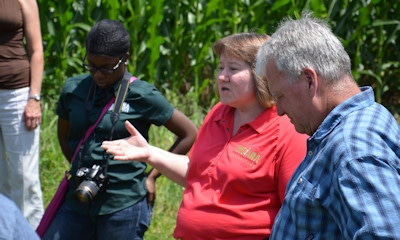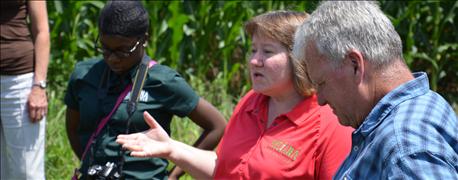
The debate over who owns data generated on the farm is heating up. Companies and agencies dealing with farmers and collecting data are putting policies and procedures in place so that they can protect farmers. Most importantly, they are being transparent about what they’re doing, and making it obvious to farmers upfront.
Here are two examples that illustrate some of the things being done.
1. INfield Advantage program outlines 6 principles farmers must agree to be in the program

EXPLAIN THE PROGRAM: Meg Leader, center, explains nutrient principles and details of the ISDA-sponsored testing program at a field tour on Mike Starkey’s farm near Brownsburg
Meg Leader of the Indiana State Department of Agriculture is director of INfield Advantage, a program heavily supported by other groups and agencies, including soil and water conservation districts, the entire soil conservation partnership in Indiana, the Indiana Soybean Alliance and the Indiana Corn Marketing Council.
We asked Leader if a farmer has to agree to share data to be in the program. There are two levels to the program- one involves only data collection, while the other involves yield trials. Privacy is a hallmark of the program, Leader says. They are very protective of farmers’ rights, especially as to who sees data and how it is used.
Here are the 5 principles farmers must agree to if they want to participate.
• Who can access their fields during the season?
Farmers must allow service providers access to fields in the program for nitrate stalk sampling in later summer.
• What remains anonymous?
Field information and results remain anonymous, Leader promises
• Are names and field locations shared?
Grower names and field locations do not appear on field reports or with aggregated data for aggregated results, Leader says.
• Does data go to research studies?
Farmers agree to allow field information to be utilized for research studies to improve the efficiency of nutrient management, which is the primary goal of the program. However, principles 1-3 still apply.
• Director reserves right to approve fields for the program.
Fields offered by entry by farmers are subject to approval for participation in the program.
2. Industry example shows how companies working with farmer data approach privacy issue
Ag Connections is a wholly owned subsidiary of Syngenta. Rick Murdock and Pete Clark started the company 18 years ago to fill a gap between farm managers or actual farm operators and those who end up doing the farm accounting bookwork. Their program is part of Agri Edge, a multi-faceted program offered to farms by Syngenta. All kinds of data collection are at the heart of what they do.
“Data privacy is an extremely important issue to us,” Murdock says. “We don’t analyze and aggregate data unless a client wants us to do so.
“And we don’t sell data,” he insists.
The data collected and stored in the cloud is available to the farmer who has signed up in Syngenta’s Agri Edge program, Murdock says. It may be yield data, fertilizer application information, cost information or anything related to crop production in the field. Whatever information that is collected belongs to the farmer, Murdock insists. If the farmer is part of a group growing a certain kind of crop for a large company, and the company requests aggregated information, it’s possible to do that, he notes. But everything would be clear up fornt, and the farmer would know what was happening before it happened.
About the Author(s)
You May Also Like




